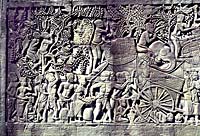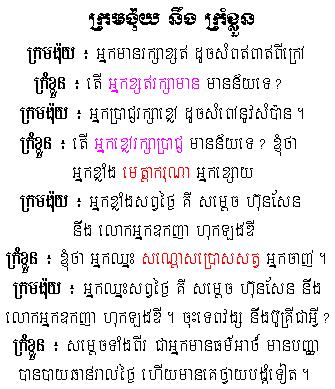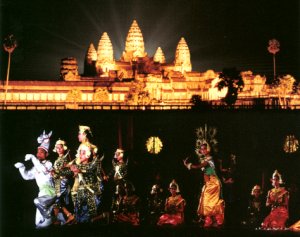LES
6
COMMANDEMENTS |
DIEU
- VS - BOUDDHA
|
THE
6
COMMANDMENTS |
At The City Of Kings-Gods (2004-Jun-08)
Planners welcome Siem Reap hotel boom
By Lily Fan Yuan, Phnom Penh Post : "Everywhere in the
world it happens," said Sok Chenda, Cambodia's point man for attracting
investment to Cambodia. "It happens in Acapulco, in Cancun. It happened
in Shanghai, and it might happen in Bali. It will happen in Hainan - and
it will happen in Siem Reap. Chenda was reflecting on the sudden bounty
of hotels - they are expected to more than double this year - springing
up in Siem Reap, the gateway to Angkor
Wat. "At one point you have enough room. At one point you
don't have enough room. At one point you will have over-capacity,"
said Chenda, secretary-general of the Council for Development of Cambodia,
which is in charge of promoting Cambodia's investment environment and approving
investment projects.
 |
Along the road to Siem Reap's airport, luxury hotels are sprouting like
mushrooms. According to the Ministry of Tourism, the
number of hotel rooms will soar by 112 percent this year. At the
end of last year, 62 hotels with 3,691 rooms were operating in Siem Reap.
Twenty-five new hotels with a planned 4,273 rooms are either under construction
or awaiting a license to operate, said Yang Van, director of the Tourism
Industry Department at the Ministry of Tourism. Most of the new hotels
will be finished this year, bringing the total rooms for Siem Reap
tourists to 7,814. By contrast, new hotels were added in Siem Reap
at an average rate of 29 percent a year from 1998 till 2003, the ministry
said. |
At least statistically, the hotels are already struggling to make money
from record numbers of tourists arriving in Siem Reap to see the ancient
temples. The average occupancy rate of hotel rooms
for all of Cambodia was 45 percent last year - approximately the
break-even point for profitability, experts say. While Siem Reap appears
set for a hotel meltdown, government and business leaders disagree about
whether the boom will end in bust and about what the new capacity will
mean for the future of the hospitality industry. Bernard Creff, director
of Ecole d'Hotellerie et Tourisme Paul Dubrule, the country's top
hospitality training school located in Siem Reap, said that because hotel
capacity was increasing faster than the number of tourists arriving, "It
is a big problem." The growing gap between rooms and tourists to fill
them would go "higher and higher", he said. It could be "dangerous" for
the hotel industry.
Thy Hourn, business development officer of Mekong Project Development Facility,
an agency affiliated with the World Bank, is an advisor to the fledgling
Siem Reap Angkor Hotel & Guesthouse Association. He said that
association members have expressed their concern about the possible result
of an over-supply of hotel rooms - price competition for everyone. Thy
Hourn said he believed the government should take this issue seriously.
"We need their intervention in this area," he said. Others, however,
see the hotel boom as a positive development, or at least as not a problem.
Sok Chenda said competition will lower prices and raise standards of service.
In highly competitive conditions, "Some suffer a lot, and sometimes
die because they are not very professional and not very capable," he
said. More competition can mean benefits for tourists, he said. "Hotels
are too expensive in Cambodia. As a client, as a tourist, I'm just waiting
(for the prices to drop)," he said.
 |
Benoit Janctoes, manager of the FCC Angkor Restaurant in Siem Reap, agreed
that more hotels would lead to increased competition. Those that can't
compete, he said, would "go away". He predicted that room
rates in luxury hotels would fall to about $50 from current rates exceeding
$100. Vann Molyvann, a noted
authority on architecture, is bullish on the hotel expansion. Supreme privy
counselor to King Norodom Sihanouk and senior advisor to the government,
Molyvann said there were not enough hotels in Siem Reap and the town "absolutely"
needs more. |
Molyvann, a past president of the Apsara Authority, designed many
of the country's landmarks including the Independence Monument, the Chaktomuk
Conference Hall and National Theater, the National Sports Complex and the
Council of Ministers building. Chris Ho, general manager of the Preah Khan
Hotel in Siem Reap, has worked for hotels for 26 years in various countries.
He said he would invest in the hotel sector now if he could. With an estimated
800,000 tourists visiting Siem Reap every year, there
are not enough rooms for all of them, he said. Regardless of whether
tourists can fill all those new rooms, some are concerned that hotel growth
in Siem Reap is proceeding too fast for the town's infrastructure to serve
them. Yang Van, director of the Tourism Industry Department of the Ministry
of Tourism, said, "We wish that the number of hotels (in Siem Reap)
would not increase so fast like this." Because Siem Reap is small,
he said, basic public services such as the water
supply, electricity and other infrastructure are lacking. "We
must not develop so fast. We should increase step by step. It should depend
on the development (of public services)," he said.
Driving the confidence of those bullish on hotel expansion is the magical
appeal of Angkor Wat. Philip Set Kao,
general manager of Borei Angkor Hotel in Siem Reap, said he believed Angkor
Wat will always bring more and more tourists. Even if it is difficult to
fill hotels now, the hotel industry is optimistic about the future, he
said. "People are looking to the next year, and the year after that, and
after that. Angkor Wat will always bring more and more people. "Because
we have Angkor Wat, everyone in the world wants to come and see this place,"
he said.
[Reproduced with
permission from The Searchlight, published by the Southeast Asia Media
Center, Phnom Penh, supported by the Independent Journalism Foundation
in New York. Articles are by trainee professional journalists from Cambodia,
Laos, Myanmar and Vietnam.] |
|


|
Le Poète Et Le Paumé
(2004-Mai-23)
Le poète
: Si les riches protègent les déshérités,
c'est comme le sampot cache la nudité.
Le paumé :
Les déshérités n'ont pas le moyen de protéger
les riches !
Le poète
: Les savants protègent les ignorants
s'ils savent que le grand navire a besoin de ses chaloupes.
Le paumé :
Les ignorants savent seulement ramer. Mais expliquez-moi la COMPASSION.
Les puissants doivent en avoir envers les faibles, et non le contraire
!
Le poète
: Même chose pour la MAGNANIMITÉ.
Les vainqueurs doivent en avoir envers les vaincus, et non
le contraire.
Le paumé :
Mais Tep Vong et Bou Kry répètent à tout le monde,
y compris les déshérités, les ignorants, les faibles
et les vaincus, qu'il faut avoir METTA, KARUNA,
MUDITA, UPEKKHA.
Le poète
: C'est pourquoi les riches, les savants,
les puissants et les vainqueurs ont nommé Tep Vong et Bou Kry "Samdech
Sangh" !
|
PEN Nearovi, Montréal, Québec, Canada
(nearovi@sympatico.ca)



